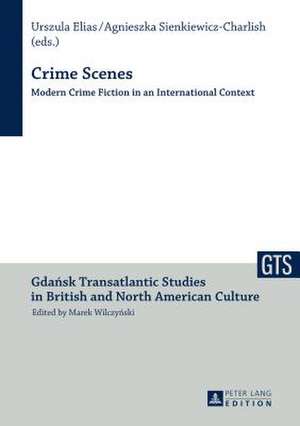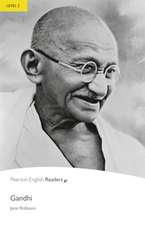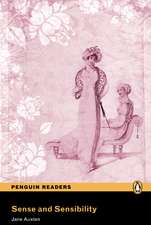Crime Scenes: Gdansk Transatlantic Studies in British and North American C, cartea 6
Editat de Urszula Elias, Agnieszka Sienkiewicz-Charlishen Limba Engleză Hardback – 24 sep 2014
Preț: 595.52 lei
Preț vechi: 773.40 lei
-23% Nou
Puncte Express: 893
Preț estimativ în valută:
113.95€ • 119.61$ • 94.58£
113.95€ • 119.61$ • 94.58£
Carte tipărită la comandă
Livrare economică 10-24 aprilie
Preluare comenzi: 021 569.72.76
Specificații
ISBN-13: 9783631641545
ISBN-10: 3631641540
Pagini: 343
Dimensiuni: 156 x 216 x 28 mm
Greutate: 0.52 kg
Editura: Peter Lang Gmbh, Internationaler Verlag Der W
Seria Gdansk Transatlantic Studies in British and North American C
ISBN-10: 3631641540
Pagini: 343
Dimensiuni: 156 x 216 x 28 mm
Greutate: 0.52 kg
Editura: Peter Lang Gmbh, Internationaler Verlag Der W
Seria Gdansk Transatlantic Studies in British and North American C
Notă biografică
Urszula Elias studied English Literature at the University of Gdansk (Poland). Her research interests include British lesbian literature and Victorian women fiction (especially the issue of «New Womanhood»). Currently she is working on George Egerton's collections of short stories. Agnieszka Sienkiewicz-Charlish is a member of the Scottish Studies Research Group at the University of Gdansk (Poland). Her research interests include Scottish literature, Gothic and crime fiction, especially «Tartan Noir» and Ian Rankin.
Cuprins
Contents: Thomas Anessi: Literary Codes of Conduct in PRL Crime Fiction: Baranczak, Joe Alex and the Powiesc Milicyjna - Nina Holst: «Way too meta»: Readers, Writers and Transmedia in Castle - Nina Muzdeka: A Pothead Detective Challenging the Genre: Thomas Pynchon's Inherent Vice - Elzbieta Perkowska-Gawlik: The Quest for Identity in Academic Mystery Fiction - Agnieszka Sienkiewicz-Charlish: Tartan Noir: Crime, Scotland and Genre in Ian Rankin's Rebus Novels - Stephen Butler: Banville, Simenon, Stark - An Existential Ménage à Trois - Wolfgang Görtschacher: Constructions of Identity and Intertextuality in Martha Grimes's The Black Cat - Aysegül Kesirli Unur: Cingöz Recai at Work: A Study on Early Turkish Crime Fiction on Film - Arkadiusz Misztal: LSD Investigations: The End of Groovy Times and California Noir in Inherent Vice by Thomas Pynchon - Monika Rajtak: Investigating Evil: Crime Fiction Remodelled in When We Were Orphans by Kazuo Ishiguro - Monika Szuba: Bloody Typical: Genre, Intertextuality, and the Gaze in The Cutting Room by Louise Welsh - Jørgen Veisland: Whose Letter? Possession, Position and Detection in Edgar Allan Poe's «The Purloined Letter» - Jadwiga Wegrodzka: The Detective as Reader: Narration and Interpretation in Arthur Conan Doyle's Detective Stories - Marta Aleksandrowicz-Wojtyna: Crime Fiction in South Africa? Nadine Gordimer's Rendition of Crime in «Country Lovers» and «Town Lovers» - Bernd-Peter Lange: South Asian Sleuths: Colonial, Postcolonial, Cosmopolitan - Dorota Babilas: Her Majesty's Own Murderer? Queen Victoria and Jack the Ripper in Popular Fiction - Rachel Franks: Gender and Genre: Changes in «Women's Work» in Australian Crime Fiction - Marie Hologa: «Snort for Caledonia» - Drugs, Masculinity and National Identity in Contemporary Scottish Detective Fiction - Miriam Loth: «...the abyss gazes also into you» - Guilt and Innocence in British Golden Age Detective Fiction and Contemporary Crime Novels - Jacqui Miller: An American in Europe: US Colonialism in The Talented Mr Ripley and Ripley's Game - Fiona Peters: The Perverse Charm of the Amoral Serial Killer: Tom Ripley, Dexter Morgan and Seducing the Reader - Cyprian Piskurek: More Than Meets the (Camera) Eye: Detective Fiction in Times of CCTV - Marta Usiekniewicz: The Eating Detective: Food and Masculinity in Robert B. Parker's Spencer Series - Arco van Ieperen: What's the Word? Sexism and Political Correctness in the Crime Fiction of Robert B. Parker and Sara Paretsky - Paul D. Brazill: The Tut.











